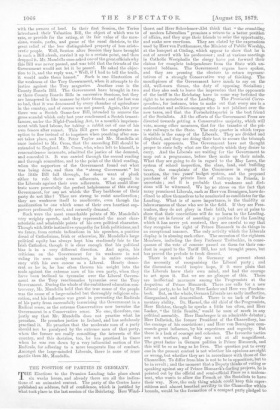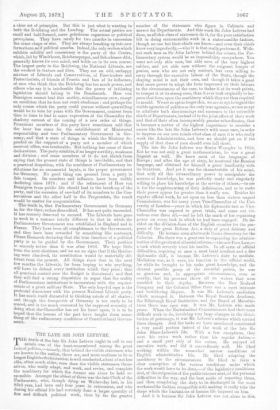THE POSITION OF PARTIES IN GERMANY.
THE Elections to the Prussian Landtag take place about six weeks hence, and already there are all the indica- tions of an animated contest. The party of the Centre have published an address, full of confidence, which is justified by what took place in the last session of the Reichstag. Herr Wind- thorst and Herr Schorlemer-Alst think that " the crumbling of modern Liberalism " promises a return to a better position
of affairs, and they urge their friends to seize the opportunity, and make now exertions. They are elated by the expressions used by Herr von Puttkammer, the Minister of Public Worship, at the banquet at Ciisling, which appear to show that he is out of accord with his predecessor ; and at various meetings in Catholic Westphalia the clergy have put forward their claims for complete independence from the State with un- wonted boldness. The Government organs have spoken, and they are pressing the electors to return represen- tatives of a strongly Conservative way of thinking. The• mouthpieces of the Government have much to say on the• old, well-worn theme, the duty of opposing Socialism ;
and they also seek to leave the impression that the opponents of the tariff in the Reichstag have in some way forfeited the right to be members of the Landtag. The Provincial Corre- spondenz, for instance, tries to make out that every one is a malcontent and sedition-monger who is not jubilant over the• new taxes, and that the Fortschrittspartei is the best friend
of the Socialists. All the efforts of the Government Press are
directed towards getting a Conservative majority, which will vote, among other measures, that for the transfer of the pri-
vate railways to the State. The only quarter in which torpor is visible is the camp of the Liberals. They are divided and dispirited, and they are doing their best to secure the triumph of their opponents. The Government have not thought proper to state fully what are the objects which they desire to carry. And the Liberals are waiting for the Government to map out a programme, before they make up their minds. What they are going to do in regard to the May Laws, the system of school inspection, the class, land, and building taxes, the complaints of the Communes in regard to taxation, the two years' budget system, and the proposed purchase of the private lines of railways in Prussia, is uncertain ; and it is probable that weakness and divi- sions will be witnessed. We lay no stress on the fact that many prominent Liberals, such as Herr von Bennigsen, have de- clined to allow themselves to be nominated as candidates for the Landtag. What is of more importance, is the timidity or lukewarmness of those who are in the field. If they are Free- traders, they do not glory in their faith, but are at pains to show that their convictions will do no harm in the Landtag. If they are in favour of asserting a position for the Landtag which it has never yet received, they are careful to say that they recognise the right of Prince Bismarck to do things in an exceptional manner. The only activity which the Liberals display is in abusing each other. The secession of the eighteen. Members, including the fiery Professor Treitschke, in conse- quence of the vote of censure passed on them for their con- duct in regard to the Tariff Bill, has not brought peace, but has proved the prelude to fresh discord.
There is such talk in Germany at present about the necessity of reorganising the Liberal party ; and the discussion would inspire hope, if it were plain that the Liberals knew their own mind, and had the courage- to act upon it. But we see no glimpse of this. There are ineffectual murmurs among the Progressists at the despotism of Prince Bismarck. There are calls for a new Liberal party, to be led by Herr Lasker and Herr von Forcken- beck. But, on the whole, German Liberals are sadly ineffective, disorganised, and demoralised. There is no lack of Parlia- mentary ability. Dr. Haenel, the old chief of the Progressists, Herr Richter, though he speaks a little too often, and Herr Lasker, " the little Semite," would be men of mark in any political assembly. Herr Bamberger is an admirable debater;: Herr Delbriick, the former President of the Chancellery, has the courage of his convictions ; and Herr von Bennigsen com- mands great influence, by his experience and sagacity. But
there is a lack of courage and cohesion. The favourite tactics are not warfare, and they are not at all magnificent.
The great factor in German politics is Prince Bismarck, and this will be so as long as he lives. The question put to every one in the present contest is not whether his opinions are right or wrong, but whether they are in accordance with those of the Chancellor. To differ from him is not to be in opposition, but to be in revolt ; and the moment that a Deputy thinks of voting or speaking against any of Prince Bismarck's darling projects, he is pointed out by the official and semi-official Press as a malcon- tent, who wants to allow the French or the Socialists to have• their way. Now, the only thing which could keep this super- stitious and almost besotted servility to the Chancellor within bounds, would be the formation of a compact patty pledged to
a cleat set of principles. But this is just what is wanting in both the Reichstag and the Landtag. The actual parties are small and half-formed, mere gelatinous organisms or political protoplasm. They have rarely for two months in succession the same shape or size. They are always breaking up into new formations, as if political amoeba. Indeed, the only section which exhibits solidity and consistency is the party of the Centre, which, led by Windthorst, Reichensperger, and Schorlemer-Alst, generally knows its own mind, and holds on in its own course. The largest party in the Reichstag, the National Liberals, are the weakest in texture and fibre. They are an odd, unhappy mixture of Liberals and Conservatives, of Free-traders and Protectionists, of friends of Prussia and foes of its influence, of men who think that the Reichstag has too much power, and others who say it is intolerable that the power of initiating legislation should belong to the Bundesrath. Herr von Bennigsen cannot lead this motley, miscellaneous crew, except on condition that he does not exact obedience ; and perhaps the only course which the party could pursue without quarrelling would be to vote for years with the Government, content from time to time to find in some expression of the Chancellor the shadowy earnest of the coming of a new order of things. Prominent members of this party have sometimes said that the hour has come for the establishment of Ministerial responsibility and true Parliamentary Government in Ger- many, and that a state of things in which the Ministry de- pended on the support of a party not a member of which received office, was intolerable. But nothing has come of these declarations. The party exhibits, if no longer servility, weakness and division ; and some members of it do not shrink from saying that the present state of things is inevitable, and that a practical despotism, with the semblance of Parliamentary in- stitutions for an ornamental facade, is the proper government for Germany. No good thing can proceed from a party in this temper. Its numbers and influence have , been visibly declining since 1874 ; and if the retirement of Herr von Bonnigsen from public life should lead to the break-up of the party, and the secession of one-half of its members to the Con- servatives and the other half to the Progrossists, the result would be matter for congratulation. The truth is, that Parliamentary Government in Germany is, for the time, rather discredited. R has not quite succeeded. It has scarcely deserved to succeed. The Liberals have gone to work in a manner totally different to that in which the Parliamentary Government was established in England and in France. They have been all complaisance to the Government, and they have been rewarded by something like contempt, Prince Bismarck declaring that the true function of a political party is to be guided by the Government. Their position is scarcely better than it was after 1866. We hope little from the next elections, and we see no signs that if the Reichs- tag were dissolved, its constitution would be materially dif- ferent from the present. All things show that in the next few months the Liberals, far from hoping to win anything, will have to defend every institution which they prize ; that all practical control over the Budget is threatened; and that they will find a strong disposition to argue that the reality of Parliamentary institutions is inconsistent with the require- ments of a great military State. The only hopeful sign is the profound discontent with 'the present National Liberal party. It has made itself distasteful to thinking minds of all shades ; and though the bourgeoisie of Germany is too ready to be soared; and is too much overawed by the supposed necessity of doing what the Chancellor has set his heart upon, it is to be hoped that the lessons of the past have taught them some- thing of the rudimentary conditions of Constitutional Govern- ment.































 Previous page
Previous page